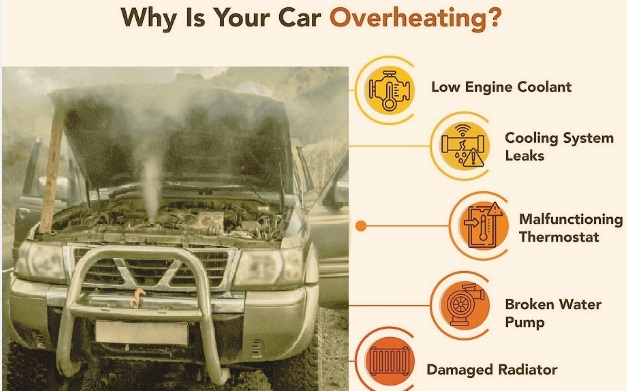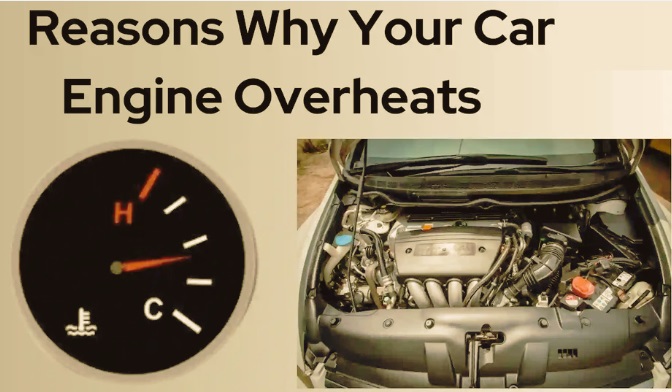Engine overheating can be a serious issue; if you drive with the engine overheating, it can cause serious damage to the car or motor, which can lead to an accident. Some vehicles come with a temperature warning light that indicates engine overheating. The warning light malfunctions, indicating engine overheating, and can cause a serious error. In this post, we will cover the details, the causes of car engine parts overheating, and their solutions.
Why do Engines get overheated?
- There are many causes for an engine to overheat. Normally, the cause of engine overheating is a fault in the cooling system and heat not being released through the engine compartment.
- The main causes are a bad radiator fan, a clogged coolant hose, and a leaking cooling system.
What Does It Mean if a Car Overheats?
- The internal combustion engine of a car works by using the power of small explosions that occur during combustion.
- The meaning of car overheating is that the system normally cools and protects the engine, but is not working well.
- If the engine working temperature is more than 190 degrees Fahrenheit, then the main reason for engine overheating is
- cooling system leaking is main reason for engine oveheating. A leak can occur through hoses, the water pump, the coolant tank, and also through the radiator. Proper inspection is needed to check the dry coolant tank
- Improper coolant also causes an error; if premixed coolant and extra water are added to the tank, it does not work in an effective way and causes overheating.
- cooling hose blockages also affect the coolant from reaching the point where coolant needed.
SIGNS of ENGINE OVERHEATING
There are different signs that are indications of engine overheating.
Temperature Gauge in the Red:
The first sign is the engine temperature gauge on the dashboard spikes to red.
Steam releases from the Hood.
- Steam also releases boiling coolant in the radiator. Smoke, if burnt, releases an oily smell that indicates oil leaks and other errors in the engine.
Smells:
- There are chances of overheating if sweet or hot oil smells exist.
Low Engine Power
- • The engine can stall or operate in limp mode for controlling damage.
Dashboard Warning Lights
- You can see the display temperature warning lights get on due to the car engine heating.
Main Causes of a Car’s Engine Overheating
main reasons for engine overheating are as
Less Coolant
- Coolant is an antifreeze solution that freezes when it has a lower temperature than water. It works better with coolant than water for cold conditions.
- The main function of coolant is to manage temperature in the engine and prevent overheating.
- If the coolant does not move towards the radiator, it causes heating.
Thermostat not working
- The thermostat of the car manages coolant flow. It allows coolant to move when the engine gets heated. The main valve of the thermostat is off for engine idling conditions.
- If the thermostat is not regulating coolant flow, it causes engine overheating.
- It occurs when the thermostat does not open the valve, preventing the engine from getting coolant.
Faulty Radiator Fan
- Coolant moves through the radiator when it absorbs the heat of the engine. The radiator cooling fan temperature is reduced through the coolant to transfer heat to the environment.
- If the cooling fan is not working at a certain level, it reduces the efficiency of the coolant.
- These faults are due to damage in the motor that operated the radiator fan.
Low Engine Oil
- oil of the engine used for lubrication and to reduce engine heat. If the car has low engine oil, it causes engine overheating.
Broken Expansion Tank
- Vehicles come with an expansion tank that is used to regulate the complete cooling system pressure.
- If the expansion tank does not release pressure in the radiator, it causes engine overheating.
Restricted Airflow
- There is a need for proper airflow when the car moves for heat dispersing in the coolant.
- Front grilles blocked by dust and bent fins also jammed the clutch fan strop airflow in the radiator, causing engine overheating.
High Engine Load
- If a high load is placed on the engine, it causes extra heat production in the engine. This high load affects the cooling system and results in overheating if the engine does not move fast.
Leaking Head Gasket
- The head gasket seals the combustion chamber and prevents engine coolant from leaking. The leaking head gasket helps coolant to go into the cylinder. That reduces cooling features, and the engine gets overheated
DAMAGED Water Pump
- • The water pump moves engine coolant in the cooling system. If the pump is damaged, it does not maintain coolant flow.
- Improper coolant circulation occurs due to a damaged water pump, causingengine overheat.
Clogged Radiator
- The radiator and condenser come with small fins for heat dissipation. Dust stops airflow in fins. that reduces the heat transfer efficiency of the cooling system. A clogged fin causes bad cooling capacity, resulting in engine overheating.
How to Manage Car Overheating?
Follow these steps for handling car overheating.
off Air Conditioning
- When you increase car speed and find that the car starts overheating, first of all, turn off the AC system. if an AC running with a high load causes overheating and other faults
Turn on the heater.
- turning on the heater to cool the engine, since the heater removes heat from the engine
Turn Off Engine
- After turning off the car AC and turning on the heater, and still overheating, turn off the engine. When the engine is off, open the hood for the engine to reach the engine.
Engine Cool Down
- not start the car until the engine temperature reduces. According to the engine’s hot features, wait for 30 minutes to start the car.
Check Radiator
- After engine cooling, open the hood and monitor the radiator; if the coolant is low, there is a chance of overheating.
- Add coolant according to requirements and check for leaks.
WHAT TO DO WHEN YOUR ENGINE OVERHEATS
Remove the AC unit’s heat.
- When you face engine overheating, turn off the AC unit to minimize engine pressure. Turn the dial for heat maximizing. Turn the heat on and send hot air away from the engine and into the cabin; that minimizes the temperature.
- It makes your environment hot but reduces heat from the engine.
Make a safe pull-over.
- When you feel safe, pull off the offense. Wait about half an hour for the engine to get cool before opening the hood.
Wait for engine cooling.
- If you touch a hot radiator cap or any engine part, it can cause burns. So wait for the vehicle to cool down, and check the temperature gauge.
- It will show normal temperature when the engine gets cool.
Monitor coolant levels.
- When the engine becomes cool, inspect the coolant reservoir. If the level becomes low, then add coolant properly, but add it after the engine cools down.
Restart the engine
- If the car is not towed, restart the engine and take the car to a repair center. While driving, also monitor the gauge temperature. If it increases again, pull over and wait for the system to cool.
WHAT NOT TO DO WHEN A CAR ENGINE OVERHEATS
AVOID PANIC.
- NOT take tension and avoid panic. The engine is not keeping cool, but it is possible.
Not drive continuously
- If the engine is overheating, do not continue driving, as that can cause damage. Driving with an overheating engine can crack the engine block and also warp cylinder heads.
Not open hood
- When pulled over, take some time for engine cooling before opening the hood to check faults. Opening the hood instantly can cause damage or serious injury.
- So wait until the temperature gauge reduces before opening the hood.
Do not use cold water for a hot engine.
- if you use cold water, the temperature change can damage engine parts by cracking
Tips to prevent a car from overheating
Follow these points for preventing engine overheating.
- Check the coolant level after some time and add liquid if needed; also, inspect leaks.
- Do proper maintenance and inspection of the cooling system, like the hose and radiator, and check if there are any clogs or damage.
- Find cracking, bulging, and wear signs through inspecting belts and hoses.
- If it finds smells or any warning signs on the indicator, react to it.
- Get maintenance from an expert technician to find the fault.
FAQs.
How long can you drive an overheated car?
- if we drive with an overheating car for 30 to 60 seconds. If there is a sign of warning, it is best not to drive with overheating. So call a recovery truck and tow it to a local repair shop.
What causes a car to suddenly overheat?
- If a car gets overheated through a bad cooling system, like a coolant leak in the hoses, a damaged radiator causes a lower coolant level.
- Other causes are a broken water pump, a faulty thermostat, and a radiator fan fault.
- • A blown head gasket and clogged coolant hose also cause overheating.
Is a car damaged if it overheats?
- If you find fault with the car, then pull off the road at a safe spot and get out of the car. If you find overheating, driving with these conditions can damage the car permanently.
Can adding oil fix overheating?
- When a car engine works, moving components produce heat, and that heating factor makes the engine overheat.
- Motor oil helps through absorption and heat redirection.
possible to recover the car from overheating?
- Yes, if you instantly respond to a fault, it can help to remove the fault as soon as possible.

